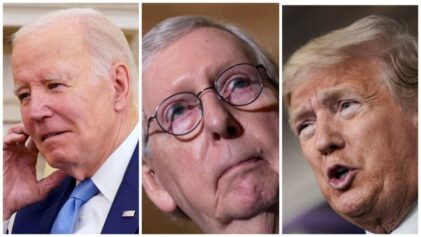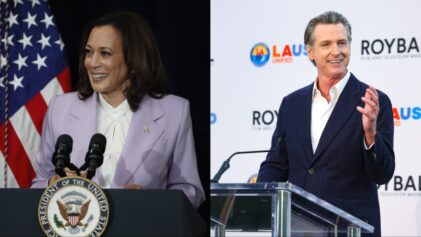President Joe Biden and Vice President Kamala Harris graced the campus of Clark Atlanta University on Jan. 11 for a monumental speech on voting rights as pressure mounts from their Black voter base to pass voting legislation.
“Pass the freedom to vote act, pass it now! It’s also time to pass the John Lewis Voting Rights Advancement Act” Biden said to a strong applause from the crowd composed mostly of politicians, dignitaries and students and staff from the Atlanta University Center.
A noticeable tension confronted the President as frustration among his supporters grow apparent. Wanda Mosley, the National Field Director for Black Voters Matter says she wants more than speeches.
“As a candidate, he said he was going to fight like hell for voting rights, so this was a good speech, but I’ve yet to see him fight like hell,” Mosley said.
At issue are two voting rights bills that are currently stalled in the Senate, but this goes back further to 2013 when the U.S. Supreme Court ruled on Shelby v. Holder, where Shelby County, Alabama, sued the Justice Department.
The landmark case targets sections 4b and 5 within the 1965 Voting Rights Act. Section 5 prohibits voting districts, mostly in the South, that previously required voting tests as of November 1, 1964, and garnered less than 50 percent voter turnout for the 1964 presidential election.
For those voting district, they had to get federal approval from the Attorney General or a three-judge panel from a Washington, D.C., District Court.
In 2013, the conservative-leaning Supreme Court ruled sections 4b and 5 of the Voting Rights Act were unconstitutional because those measures were no longer relevant in districts that had discriminatory voting practices during the 1960s.
The court also felt because barriers to voting were not as they were during the 1960s, states no longer needed federal approval to change voting laws at the state level.
Since the Supreme Court’s ruling, the Brennan Center for Justice reports “hundreds of restrictive voter laws making it harder to vote” were introduced.
Last year, Georgia passed Senate Bill 2020, which placed restrictions on absentee and early voting among other measures. Vice President Harris made note of such legislation in her speech. “I have heard your outrage about the anti-voter law here, and how many voters will likely be kept from voting,” Harris said.
“We know we face arrest for offering people snacks and water waiting in line, we know the subversion part of the bill is removing duly appointed members of board of election across the state for no other reason for not being white or republican,” Mosley said of Georgia’s restrictive voting laws.
The John Lewis Voting Rights Advancement Act would essentially reverse the Supreme Court’s decision on Shelby v. Holder and would require states to get federal approval before passing restrictive voting laws.
The Freedom to Vote Act builds in added protections to voters including expanding absentee voting, allows people to register to vote on election day and restores felons’ right to vote once they’ve completed their sentences, among other things.
Critics of the Biden administration like Mosley say they would like to hear a clear plan of action on voting rights. “I would have liked to see a concrete plan that said I will do this action on this day by this timeframe. I would have liked to have heard an actual deadline by which this was going to happen,” Mosley said.
Another hurdle voting rights must cross, a Senate with Republicans and some Democrats unwilling to support the bills. A possible workaround would be eliminating the Senate filibuster, which is a procedural rule that requires debate on a bill be cut off if at least 60 Senators agree to do so, but that means members of the opposing party must support ending debate, which isn’t going to happen in a Senate Republican conference headed by Minority Leader Mitch McConnell.
Getting rid of the filibuster would mean only a simple majority vote — all 50 Senate Democrats plus Harris’ vote as a tiebreaker — would be needed to pass the voting rights bills, but there is still the problem of a few Senate Democrats not supporting filibuster elimination.
Spelman College junior Melina Watson remains hopeful voting rights legislation will be signed into law, but she too wants to see some action. “Joe Biden’s Black voter base expects him to be commanding, expects him to bear the same sentiments that we do regarding the necessity of voting rights legislation,” Watson said.
More news from our partners:
Is This Enough? Santa Monica Offers Descendants of Displaced Black Communities Affordable Housing.


